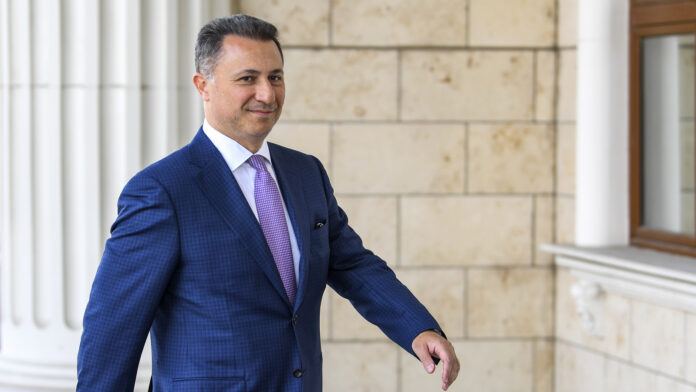North Macedonia’s former Prime Minister Nikola Gruevski hit back on Tuesday evening after his successor as leader of the VMRO DPMNE party, Hristijan Mickoski, told Frankfurter Allgemeine Zeitung that the fugitive ex-premier had done a “dirty deal” with the Social Democratic Party government to push through constitutional changes that could ease the country’s path towards EU membership.
Mickoski also accused Gruevski, a fugitive who is wanted to serve jail terms for crimes committed while he was prime minister, of trying to split the VMRO DPMNE.
“Can he [Mickoski] personally say in public, what move, statement, piece of writing or anything else have I used to try to split the [opposition] party, and can he offer evidence that I have agreed [to play] a dirty game with the government that I should put into practice with the help of my supporters inside the party?” Gruevski wrote on Facebook.
The spat continued as Mickoski responded to Gruevski on Wednesday.
“Nikola. I have no intention of taking part in a scenario to create discord [within the opposition party] through public correspondence. One day, when we see each other face to face, I will tell you the details, if you are prepared to hear them,” Mickoski wrote on Facebook.
The rift between the current opposition chief and his predecessor Gruevski, who is currently hiding in Hungary to evade prison sentences and criminal charges in several corruption cases in his home country, started after Mickosk’s accusations were published in the German newspaper.
“Gruevski has secret communication with the government,” Mickoski told Frankfurter Allgemeine Zeitung.
“The government believes it can divide our party” but it will not succeed, he added.
The spat comes against the backdrop of a push by the Social Democrats-led government to secure a two-thirds majority in parliament for the much-disputed constitutional change to have Bulgarians mentioned in the preamble to the constitution among the state’s other foundational peoples.
The Social Democrats, who have a slim majority in parliament, are in a tight spot as they have to push the change through by November if the country hopes to avoid its EU accession being vetoed again by neighbouring Bulgaria, which is demanding the change.
The Social Democrats lack at least eight MPs for a majority, and they hope these votes may come from the VMRO DPMNE-led opposition, which under Mickoski has been firmly against the change.
The rift between the current opposition leader and his authoritarian predecessor also comes after recent changes to the Criminal Law, to reduce sentences for the crimes of ‘criminal enterprise’ and ‘misuse of office.
This would also mean that the period of time in which such cases expire would be automatically shorted – a change that would benefit Gruevski and other former public officials accused of committing crimes while in office.
The change sparked suspicions that it may have been part of a secretive deal between the government and Gruevski, so that he and many of his former top officials could get away with some of their alleged wrongdoings in exchange for their support for the constitutional changes.
This has been categorically denied by the government and the ruling Social Democrats on several occasions.
They insisted that they have not been in contact with Gruevski or any other former VMRO DPMNE official.
“We are saying that there are structures inside VMRO DPMNE who think that this isolationism that the party is pushing is not good for the country and that the constitutional changes must happen,” Darko Kaevski, a Social Democrat MP, told media on Tuesday.
“Rifts have become common practice in the VMRO DPMNE and their most common excuse is to blame the Social Democrats for it,” he added.
Source : Balkan Insight

